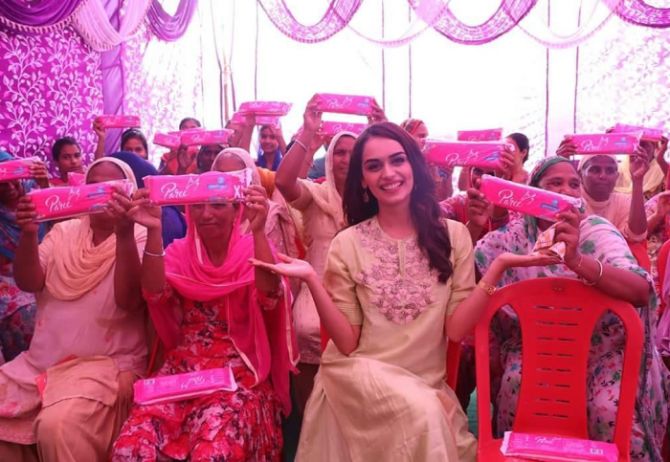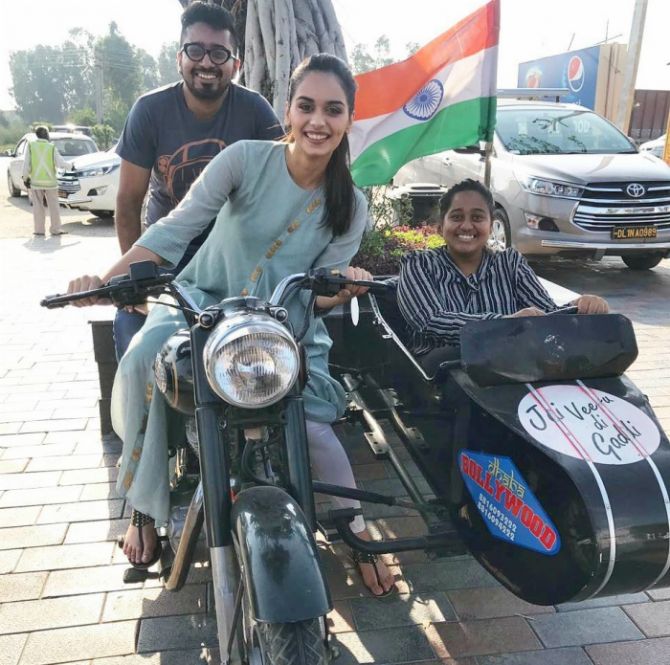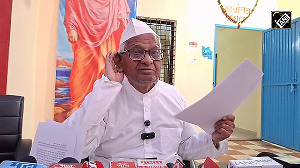Spreading awareness about menstrual hygiene is the medical student-turned-beauty-queen's pet project.

Photographs: @manushi_chhillar/Instagram.
At a time when the government of India has refused to listen to reason concerning the need to exempt sanitary napkins from the GST burden -- interestingly bindi, sindoor and kajal are exempt from GST! -- Manushi Chhillar used the Miss World platform to highlight the urgent need for increased menstrual hygiene awareness in India.
Chhillar was the co-winner of the Beauty with a Purpose competition where she presented her Project Shakti.
She said before the competition, 'I am not yet a doctor but I am not voiceless. And this voice and the desire to use it to make a difference in the world around me drove me to start Project Shakti, which aims to address an issue faced by millions of women in India -- the lack of access to safe and affordable menstrual hygiene management.'
She later added, 'It was such an emotional moment for me to be able to show everyone a glimpse of the work we have been doing.'

For the supply from Walmart to the homes, Project Shakti encourages women from the villages to become entrepreneurs. 'This is a two-pronged approach which ensures supply as well as provides women with employment, Chhillar says.
Chhillar also shared some hard facts about menstruation in India.
Fact 1: 'Only 12% of menstruating women in India actually use sanitary pads!! The majority still use unsterile rags or 'kapda' as absorbents. Many girls in the interiors of the country are forced to use sand, ash and dried leaves as menstrual absorbents! This is because of no access or high expense of sanitary pads.
Fact 2: 'Many young women and girls walk up to 2 km from their homes to bury their used pads in an abandoned land.
Fact 3: 99% of girls in India don't undergo a formal conversation on menstrual hygiene in their lifetime! Many girls still believe they are being punished by God every month.
Fact 4: 'It has always been surrounded by taboos and myths that exclude women from many aspects of socio-cultural life.'
Chhilar said, 'In India, the topic has been a taboo until date. Such taboos about menstruation present in many societies impact on girls' and women's emotional state, mentality and lifestyle and most importantly, health.
'The challenge, of addressing the socio-cultural taboos and beliefs in menstruation, is further compounded by the low girls' knowledge levels and understandings of puberty, menstruation, and reproductive health.'

Chhillar highlighted the need to follow 'a strategic approach to combating these issues.'
She said, 'Menstrual hygiene and management can be essential in ensuring that your everyday life is not interrupted by menstruation. It ensures that you can continue with your daily routine such as going to school, going to work or doing household chores.
'It can also prevent potential situations of embarrassment and in turn, make you feel confident about yourself and your body... Maintaining proper menstrual hygiene is important for your well-being and development.'
Chhillar wrote on Instagram: 'Shakti means "Power." When I started my project, I named it Shakti because I wanted to empower each of the women whose lives it touched, and empower them to also make a change in the lives of other women in their circles.
'But as I continue this journey, what I appreciate is that it has really empowered me -- to know that my voice has meaning, and the learning and agency that I have been privileged to have do not end with me.
'In India, the people we most admire are those whose work defines them -- "Karma Yogis" -- and when one's purpose defines one's actions in life, then the outcome can truly be something of beauty.'










